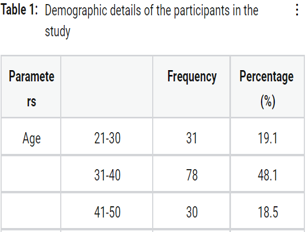Abstract
COVID-19 is spread by human-to-human transmission through many modes. To date, no antiviral treatment or vaccine has been explicitly recommended for COVID-19. Therefore, applying preventive measures to control COVID-19 infection is the most critical intervention. The rate of disease spread is high in hospitals, and hence the health care workers (HCWs) are at most risk of getting infected. This is an online observational, cross-sectional survey carried out in Tamil Nadu state of South India using a snowball sampling technique during April 2020. Medical, nursing, physiotherapy and allied health science's staff from various hospitals are included in the survey. Using Google forms, the willing participants were encountered with 30 multiple choice questions related to clinical knowledge of COVID-19. By the end of the month, we have received 162 responses from various HCWs; among them are medical, nursing, physiotherapy and other paramedical staff. Most of the respondents were nurses (29.6%) and physician’s (23.4%). The average knowledge score of all the respondents in regards to COVID-19 was moderate at a correct overall rate of 62.1%. The study results say physicians showed the highest knowledge score on COVID-19, followed by nurses and other paramedics. There is a gap between the knowledge and information regarding the clinical aspects of COVID-19 among health care workers.
Full text article
References
Bhagavathula, A., Shehab, A. 2019. The Story of Mysterious Pneumonia and the Response to Deadly Novel Coronavirus (2019-nCoV): So Far! New Emirates Medical Journal, 1(1):7–10.
Bhagavathula, A. S., Aldhaleei, W. A., Rahmani, J., Mahabadi, M. A., Bandari, D. K. 2020. Knowledge and Perceptions of COVID-19 Among Health Care Workers: Cross-Sectional Study. JMIR Public Health and Surveillance, 6(2):e19160.
Emergency.cdc.gov 2021. Outbreak of Pneumonia of Unknown Etiology (PUE) in Wuhan, China. HAN Archive - 00424 | Health Alert Network (HAN). Centers for Disease Control and Prevention. Accessed on: 10 May 2021.
Emergency.cdc.gov. 2021. Update and Interim Guidance on outbreak of 2019 Novel Coronavirus (2019-nCoV). HAN Archive - 00427 | Health Alert Network (HAN). Accessed on: 10 May 2021.
McEachan, R., Taylor, N., Harrison, R., Lawton, R., Gardner, P., Conner, M. 2016. Meta-Analysis of the Reasoned Action Approach (RAA) to Understanding Health Behaviors. Annals of Behavioral Medicine, 50(4):592–612.
Roy, D., Tripathy, S., Kar, S. K., Sharma, N., Verma, S. K., Kaushal, V. 2020. Study of knowledge, attitude, anxiety and perceived mental healthcare need in Indian population during COVID-19 pandemic. Asian Journal of Psychiatry, 51:102083.
Tinyurl.com 2021. Infection prevention and control during health care when novel coronavirus (nCoV) infection is suspected. World Health Organization. Accessed on: 10 May 2021.
Wang, D., Hu, B., Hu, C., Zhu, F., Liu, X., Zhang, J., Wang, B., Xiang, H., Cheng, Z., Xiong, Y., Zhao, Y., Li, Y., Wang, X., Peng, Z. 2020. Clinical Characteristics of 138 Hospitalized Patients With 2019 Novel Coronavirus-Infected Pneumonia in Wuhan, China. JAMA, 323(11):1061–1069.
WHO 2019. Coronavirus Disease 2019 (COVID-19) Situation Report – 46. World Health Organization. Accessed on: 10 May 2021. 9p.
W.H.O 2020. Pneumonia of Unknown Cause - China. World Health Organization. Accessed on: 10 May 2021.
WHO 2020. Rolling Updates on Coronavirus Disease (COVID-19). World Health Organization. Accessed on: 10 May 2021.
Zhang, M., Zhou, M., Tang, F., Wang, Y., Nie, H., Zhang, L., You, G. 2020. Knowledge, attitude, and practice regarding COVID-19 among healthcare workers in Henan, China. Journal of Hospital Infection, 105(2):183–187.
Authors

This work is licensed under a Creative Commons Attribution-NonCommercial-NoDerivatives 4.0 International License.

